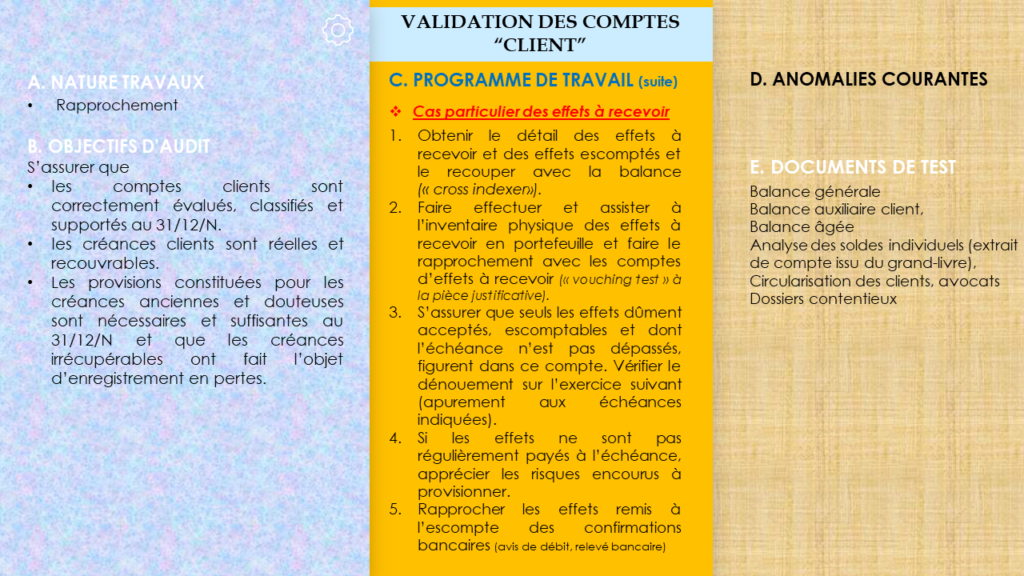Auditing is a crucial step for any company. It provides assurance as to the accuracy and reliability of financial information. However, it can also have its drawbacks, such as high costs and long lead times. In this article, we take a closer look at the pros and cons of auditing.
What to do with your company's profits? 🤔 Expert-Comptable advice
[arve url="https://www.youtube.com/embed/Fu1H_UCId0o "/]
Why have an audit?
Auditing is essential for verifying and validating the accuracy of a company's financial information. It ensures that the financial statements presented are reliable and comply with current accounting standards. Accounting audits are carried out by independent, competent professionals, such as chartered accountants or statutory auditors.
During the audit, auditors examine the company's financial transactions, supporting documents and internal control procedures. They test accounts and balances to detect any discrepancies, anomalies or fraud. In addition, they ensure that accounting principles have been correctly applied, and that the information communicated is consistent and understandable.
Auditing offers a number of advantages, both for the company and for external stakeholders. For the company, it helps build confidence in its financial statements and identify potential problems or malfunctions in its financial management.. For external stakeholders, such as investors, creditors or regulatory authorities, the audit provides assurance as to the reliability of the financial information communicated.
In conclusion, auditing is a crucial process for ensuring the transparency and reliability of a company's financial information. It plays an essential role in decision-making, stakeholder confidence and preserving the integrity of the financial system.
When should you have your accounts audited?
An accounting audit is a procedure carried out by a chartered accountant to verify and audit a company's accounts. It is generally carried out at the end of the fiscal year or at the end of each financial year.
Auditing is essential to ensure the conformity of financial and accounting information presented by a company. It enables us to detect any errors, omissions or fraud in the accounts.
An audit is recommended when :
1. The company is required by law to: Some companies are obliged to have their accounts audited by a chartered accountant, notably sociétés anonymes (SA) and sociétés en commandite par actions (SCA).
2. The company wishes to obtain external financing: If the company needs to present its accounts to potential investors or financial institutions to obtain a loan, it is often necessary to have audited accounts to increase the company's credibility.
3. The company wants to improve its internal processes: The audit also identifies any anomalies or weaknesses in the company's accounting systems, which can lead to improvements in internal processes.
4. The company wishes to satisfy external stakeholders: Shareholders, creditors and other external stakeholders may need audited accounts to make strategic decisions.
In short, an audit is generally recommended at the end of the fiscal year or accounting period, but can also be carried out in other specific situations. This guarantees the integrity and reliability of the financial information presented by the company.
How do you make a good audit?
To perform a proper accounting review on a news site, it's important to follow a few key steps. Here's how:
1. Collection of accounting information : Gather all relevant financial documents such as financial statements, invoices, bank statements and contracts.
2. Checking calculations : Review all financial transactions and make sure the calculations are correct. Check additions, subtractions, multiplications and divisions.
3. Analysis of financial statements : Examine each account individually to ensure that it is properly recorded and that there are no errors or omissions. Compare balances with bank statements and corresponding invoices.
4. Checking journal entries : Review all journal entries to confirm that they are correct and properly filed. Also make sure they are posted to the right accounts.
5. Bank reconciliation : Perform a bank reconciliation by comparing bank account balances with bank statements. Check discrepancies and correct errors if necessary.
6. Error detection and correction : If errors are identified, correct them immediately, and make sure you understand why they occurred so you can avoid them in the future.
7. Preparation of financial reports : Generate final financial reports, such as balance sheet, income statement and cash flow statement. Ensure that all information is complete and accurate.
8. Document archiving : Archive all relevant accounting documents in accordance with current regulations.
By following these steps, you'll be able to carry out a thorough accounting review and ensure the accuracy and reliability of your financial data on your news site.
Who can audit the accounts?
The financial statements may be audited by a certified public accountantalso known as statutory auditor. This professional is responsible for auditing a company's financial statements to ensure their accuracy and compliance with current accounting standards. The statutory auditor examines accounting documents such as balance sheets, income statements and cash flow statements, and carries out tests to detect any errors or fraud. Their role is essential in guaranteeing the reliability of the financial information provided by a company.
In conclusion, the audit of the financial statements presents both benefits and disadvantages. On the one hand, it helps to ensure the reliability of financial information, detect potential errors and fraud, and boost the confidence of investors and creditors. On the other hand, this procedure can be costly in terms of time and resources, without guaranteeing total detection of errors or fraud. What's more, it can create additional stress for the management team involved in the review process.
It is therefore essential for companies to weigh up the advantages and disadvantages before deciding to carry out an audit. It may be advisable to seek the advice of a chartered accountant or a specialized firm to carry out this complex task. In any case, it's important to understand that auditing is a crucial step towards financial transparency and good corporate governance.








